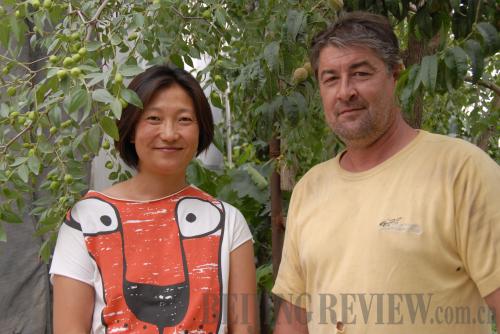|
 |
|
French winemaker Thierry Courtade and his wife Emma Gao pose at their winery, Silver Heights, in Ningxia Hui Autonomous Region (MA LI) |
For those tired of the hustle and bustle of mega Chinese cities like Beijing and Shanghai, there is a tranquil sylvan retreat, just two hours away by flight from the capital--yet few people know about it. For instance, Abdou Lahad, a 25-year-old Senegalese student studying Chinese in Ningxia University, said, "Before I got a government scholarship to study in Ningxia, I had never heard of the place in my life. Even in Beijing, there are people who have no idea where Ningxia is."
Yet Ningxia Hui Autonomous Region in northwest China, sandwiched between Inner Mongolia Autonomous Region and Gansu Province, was a flourishing trade hub on the ancient Silk Road. It boasts an ancient civilization that built towering mausoleums for its rulers, known as the Oriental Pyramids, and is one of the 10 biggest food crop-producing areas in the country. However, many guidebooks still describe Ningxia as an arid region encircled by three deserts, which probably contributed to its obscurity.
Ningxia, home to the Huis, China's biggest ethnic community who are Muslims, has had considerable success in fighting desertification by planting trees and shrubs. Foreigners come to study the afforestation method and the result, which can be seen with the naked eye. The roads are lined with trees and shrubs, giving Yinchuan, the capital of the autonomous region, the appearance of an oasis. There are few cars and an absence of traffic snarls and honking. Little lakes and parks punctuate the scenery and there are arresting sculptures at regular intervals. People go about their work at a leisurely pace with a tangible feeling of well-being. Yet Ningxia has modernity where it is needed. The buildings are newer than those in Beijing and a town planner's delight. Telecommunication is remarkably good and most of the mod cons associated with big cities are available here.
So besides being a holiday haven, Ningxia is also an ideal place for expats to work and live--like Rema Chhakchhuak, an Indian educationist, author and poet. Chhakchhuak comes from Mizoram, a province in northeastern India that, like Ningxia, is home to an ethnic group, the Mizos. Like Ningxia, Mizoram too lies in the shadow of other better-known Indian provinces.
When Chhakchhuak first came to China as an English teacher, his base was Xi'an in Shaanxi Province. But the husband-wife duo, coming from a small place, wanted to work in a small place in China as well where life would be unhurried and serene unlike the feverish pace in big cities. So, they moved to Yinchuan with Chhakchhuak working with the Beifang Universityof Nationalities.
The life here gives Chhakchhuak ample time to write. His first novel Zorampari, written in his native tongue Mizo, is about a treasure hunt that throws light on a forgotten chapter in India's history, the Mizo armed uprising against the Indian Government. Chhakchhuak also blogs with gusto, especially about his experiences in China.
Western and younger expats are also making Ningxia their home because they want a slow and tranquil life. Rebecca Finke left her home in New Jersey seven years ago to make Ningxia her new home. The 29-year-old's mother was born and brought up in Hong Kong, and she was interested in learning more about the place and culture her mother grew up in. But Finke did not want to go to a big city, preferring instead a smaller and quieter place. So, she chose Ningxia.
After teaching English in Ningxia Medical College for three years, Finke took admission in Ningxia University's School of International Education to learn Chinese and last year, completed her master's degree. In August, she will start her doctorate studies. What adds zest to her Ningxia life are the Helan Mountains, where she goes hiking, and the Sand Lake, a combination of dunes, marshland and lake views renowned for its variety of aquatic birds and animals.
Ningxia has also offered her a close glimpse into Chinese hearts. One year, a colleague invited her to her family home in the countryside to celebrate the Chinese New Year. It was bitingly cold, and there was no hot water. So, Finke had to go without a shower during her entire stay with the family. At times she desperately longed to go back to her own apartment and have a hot shower. But her hosts were so kind, going out of their way to make her feel at home, that the place, though cold, became home and the stay one of her most memorable experiences in China.
The author is an editorial consultant for Chinafrica magazine, published by Beijing Review
|
